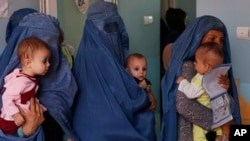Afghanistan was already deeply mired in one of the world’s worst humanitarian crises before the Taliban swept into Kabul on August 15. Now aid organizations are scrambling to deal with thousands of newly displaced persons, growing needs, and an uncertain operating environment.
“So everything at the moment in terms of how UNICEF works is up in the air,” said Samantha Mort, communications chief in Kabul for the U.N. Children’s Fund (UNICEF).
UNICEF, like most other U.N. agencies has been in Afghanistan since the 1960s and is staying and continuing to assist the population, but has relocated some of its international staff temporarily out of the country. Most U.N. Afghan staff have been told to work from home for now, while their agencies – which have dealt with the Taliban for years – figure out if and how they will be affected.
“We have not yet had a meeting at the central level with the new de facto authority,” Mort explained of UNICEF’s discussions with the Taliban. “We are having dialogue at the regional and local level with local interlocutors. So we do not have a system in place yet.”
“I think for many of us and our peer agencies it is important that we have a secure environment to operate,” said Ram Kishan, deputy regional director of Mercy Corps. “We want to have clarity on humanitarian access space.”
Conflict, drought and COVID-19 have left up to 20 million people – half of whom are children -- in need of humanitarian assistance in Afghanistan.
The Taliban have indicated they want the U.N. to stay and continue helping the people.
Calls for unfettered access
But humanitarians are emphatic that their core principles must be respected.
“We are neutral, we are independent, and we must have unfettered access,” said Andrew Patterson, the World Food Program’s deputy country director for Afghanistan. “We cannot be controlled in the way we access, or we can't operate.”
With one in three Afghans coping with daily hunger and two million children malnourished, WFP was feeding four million people across the country each month. It is planning to scale that up to nine million by November.
Aid agencies are used to working in difficult and dangerous conditions. But with high levels of insecurity and an uncertain political situation, the environment is becoming ever more complex.
“Across Afghanistan, supplies are constrained and will need to be replenished,” U.N. spokesman Stephane Dujarric told reporters last week. “This will continue to be a challenge due to limited funding and, of course, the logistical challenges.”
Supplies, funding running out
WFP says its food supplies will run out next month, while the World Health Organization (WHO) said Friday their stocks would run out in a matter of days. That catastrophe was averted Monday, when the first of three planned flights carrying 12.5 metric tonnes of medicines and supplies arrived from WHO’s hub in Dubai, aboard a Pakistani-provided flight into Mazar-i-Sharif airport in northern Afghanistan.
Kabul airport is a critical lifeline for the landlocked country, but due to the deadly terrorist attack on Thursday and questions about who will run it after the Americans depart, humanitarians are relying on other methods of bringing supplies in, primarily across land through four border crossings from Pakistan and Iran.
Bank closures and cash shortages are presenting another difficulty, both for aid agencies and the general population.
“Food prices have gone up, the Afghan currency has really devaluated and that has also impacted inflation,” said Kishan of Mercy Corps. “So even those who had some means were not able to buy enough food for their family.”
Winter starts setting in around October, and humanitarians are also extremely concerned about the situation of more than a half-million displaced people.
“Our real concern is being able to get the food that's required to our warehouses before access is cut off,” WFP’s Patterson said of the challenges of Afghanistan’s winters. “Otherwise those people are going to go hungry and we won't be able to get to them.”
While the U.N. and many aid agencies are continuing to deliver services, they face severe funding shortfalls – a U.N. appeal for $1.3 billion is only about 40% funded. They worry that donor funding will dry up to a Taliban-led government. They are also concerned that governments may tighten sanctions against the Taliban – which are a U.N. Security Council-designated terrorist group – and that could slow their work down as they seek humanitarian exemptions.
“We would like it if development aid stops, please repurpose that funding for humanitarian assistance,” Patterson said. “Not one cent that goes for humanitarian assistance goes to the government, goes to the Taliban, goes to the military, goes to political actors.”
He said keeping the aid flowing is the only way humanitarians will be able to stop mass famine from descending on Afghanistan.







